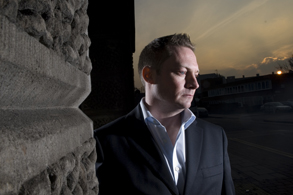Gary Lockton still remembers grabbing the Tannoy to welcome more than 150 employees onto his privately chartered jet, bound to Barcelona as a long-weekend reward. The year was 1999. Deepend, the digital agency that he founded with Poke's Simon Waterfall and David 'Gravy' Streek, was in its fifth year and flying. Having started out of Lockton's house in Fulham, the digital agency had grown quickly to span 17 operations in seven countries. In 1999 alone it had notched up over 20 of the most coveted creative awards working for brands including Apple, Nike, Ikea and Volkswagen.
But Lockton's fate was to take an ugly turn. With the IT sector teetering on the brink a year later, brands frantically pulled their digital business. At the end of 2000, parent company DeepGroup was a global £25 million operation billing £800,000 a month. By March 2001, it was unable to stump up enough cash to make its staff redundant, and the agency went into liquidation shortly afterwards.
Bouncing back
Deepend's loss was widely mourned. But Lockton had no time for that. Instead he found himself saddled with much of the blame and sizable debts. To begin the repayment process, Lockton got new work at North Creative, where he secured jobs for 10 of his former employees, and later remortgaged his house. But it was hardly enough to restore the legacy of a company once regarded as being at the forefront of digital creativity.
Following this period of "insipid fear, innate caution and total lack of gung-ho", Lockton, 38, has re-emerged as managing director of Last Exit, a digital strategy and design agency. With offices in London and New York, Last Exit reunites Lockton with partners Fred Brown and Nuri Djavit, who had set up Deepend New York. The experience must be particularly unusual for Brown, who now technically finds his old boss reporting to him. But Lockton claims to have no problem with that. "I haven't found anyone who shares the same spirit or ambition to grow," Lockton says of his colleague. "Whereas I tend to shoot from the hip, Fred is pretty grounded. Plus we don't have to worry about what each other as partners is doing in the business, which is a huge relief."
The dartboard inside Last Exit's otherwise austere office in London's Borough is a far cry from Deepend's Shoreditch base, which featured an aeroplane wing for its boardroom table and a flashy computer museum. Lockton believes it is illustrative of an industry that has also become more serious in appearance. "The days of sheer unbridled creativity purely for its own sake are over," he says. "Nowadays brands are likely to judge an agency on how it meets the technical aspects of digital, such as SEO (search engine optimisation), DDA (Disability Discrimination Act) compliance and content management."
Agencies no longer need play such a didactic role. "Marketers only have to see their kids on Facebook or Google themselves to realise the importance of digital in their daily life," says Lockton. "Digital agencies now work directly with brands and no longer just as suppliers to advertising agencies."
No regrets
With such a sedate view of how digital has developed in the last decade, would Lockton have done things differently? He concedes that Deepend might have paid the price for a "lack of financial rigour" and an enormous group offering of companies that could often confuse as much as compel. Yet many of the reasons Deepend suffered, he adds, were also what propelled it to success. "There were certain principles that made the agency so open and free-flowing," he says. "Unlike conventional agencies, we had few ongoing retainer contracts. We kept a standard daily rate and never charged a lot for our work."
Better prepared
In his role, Lockton is responsible for servicing brands including Visit Britain and Jockeyphone, and is tasked with growing the agency's new business and headcount by three times over the next couple of years. He concedes that Last Exit will never reach the stretch of Deepend. "In the 90s, technology was more up in the air and there were many ways of creating digital content, which demanded more people. That's no longer the case."
That point is vindicated by Last Exit's wealth of services. Despite a team of well under 30 people, it can offer brands everything from web build to branded applications, analytics and tracking, and campaigns created in Papervision3D.
Last Exit also employs a financial director to oversee growth plans, something that Deepend sorely lacked. "You need an element of experience and grey hair," Lockton says. And while the credit crisis may be a source of deja vu, Lockton says digital is better placed than most media to survive. "Digital is more embedded in other parts of a brand's business outside of advertising, such as customer acquisition," he says. "Deepend has also imbued us with a fearlessness, and a responsibility not to make the same mistakes again."
Last Exit is the latest in a string of digital shops that have risen from the ashes of Deepend. They include Glue, Deconstruct and Poke. While Lockton admits he does not necessarily expect to be welcomed by all of Deepend's alumni, he is more proud of them "than most people will ever know". He is clearly at peace with his past. The question is: can he seal his legacy in Last Exit's future?
REALITY
2008 to present: Partner at Last Exit
2003-2006: Co-founder of Seriously
2001-2002: Chief executive, North Creative/director, Beatwax
1994-2001: Co-founder and chief executive, Deep Group
VIRTUAL REALITY
- What do you do for fun?
I am still the only full-time drinking and smoking mountain marathon runner. The experience is great for body and mind and has many parallels with business.
- What do you watch on TV?
The Discovery Channel. If pub quizzes hadn't been ruined by mobile phones, I'd probably win all of them.


